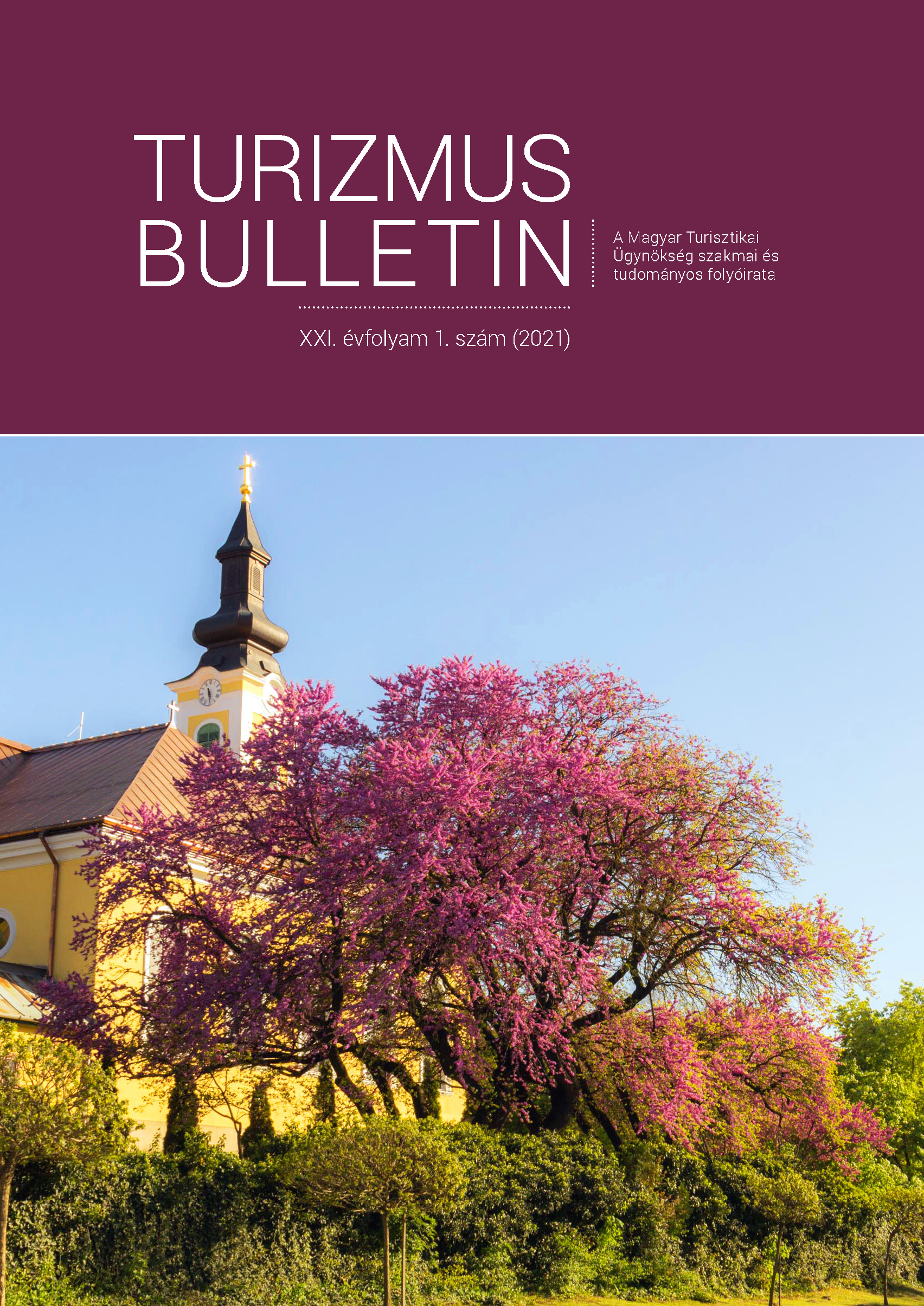Vendégvélemények a zöld szállodai eszközök használatáról
DOI:
https://doi.org/10.14267/TURBULL.2021v21n1.3Kulcsszavak:
zöld szálloda, környezettudatosság, fogyasztói profilAbsztrakt
Napjainkban, a fenntartható fejlődési célokat (Sustainable Development Goals3) előtérbe helyező világban, egyre nagyobb figyelmet kap környezetünk védelme. Az egyes iparágakban működő cégek különböző súllyal érintettek ebben a témában, de az biztosan elmondható, hogy minden vállalkozásnak, így a turisztikai vállalkozások tevékenységének is van környezetkárosító hatása. A tanulmány célja annak vizsgálata, hogy a szállodákban a vendégek mennyire tolerálják a különböző zöld, környezettudatos eszközök használatát, illetve a használat során mennyire sérül a vendégélmény. A kutatás kitér arra is, hogy a vendégélmény sérülése árán is támogatók-e a vendégek a fenntartható fejlődési célok elérése érdekében. A szekunder kutatás segítségével feltérképezésre kerül az elméleti háttér, kiegészítve a téma korábbi kutatási eredményeinek bemutatásával. A primer kutatási szakaszban egy 204 fős minta elemzésének eredményei kerülnek bemutatásra.
Hivatkozások
BAKER, M. A. – DAVIS, E. A. – WEAVER, P. A. (2014): Eco-friendly Attitudes, Barriers to Participation and Differences in Behavior at Green Hotels. Cornell Hospitality Quarterly. 55(1). pp. 89–99. https://doi.org/10.1177/1938965513504483
DERAMAN, F. – KASSIM, A. R. A. – ISMAIL, N. – ARIFIN, A. I. M. – ZAINI, Z. M. Md. (2015): The Intention of Hotel Guests’ to Engage in Green Activities. Journal of Applied Environmental and Biological Sciences. 5(6S). pp. 120–125.
DOLNICAR, S. – LEISCH, F. (2008): An investigation of tourists’ patterns of obligation to protect the environment. Journal of Travel Research. 46(4). pp. 381–391. https://doi.org/10.1177/0047287507308330
FESTINGER, L. (1957): A theory of cognitive dissonance. Evanston, Row Peterson.
FORGÁCS A. (2017): Fejezetek a kommunikáció szociálpszichológiájából. Akadémiai Kiadó. https://doi.org/10.1556/9789634541059
HAN, H. – HSU, L. – LEE, J. (2009): Empirical investigation of the roles of attitudes toward green behaviors, overall image, gender and age in hotel customers’ eco-friendly decision-making process. International Journal of Hospitality Management. 28(4). pp. 519–528. https://doi.org/10.1016/j.ijhm.2009.02.004
HAPP É. (2014): Fenntartható turizmus és felelősségvállalás. Gazdaság & Társadalom. 6(1). pp. 90–101. DOI: 10.21637/GT.2014.1.07.
KUBICKOVA, M. – PARSA, H. G. – NUSAIR, K. – HU, H.-H. S. (2014): Does green hotel image influence guests’ behavior: The case of generation Y. Journal of Services Research. 14(2). pp. 9–32.
LAROCHE, M. – BERGERON, J. – BARBARO-FORLEO, G. (2001): Targeting consumers who are willing to pay more for environmentally friendly products. Journal of Consumer Marketing. 18(6). pp. 503–520. https://doi.org/10.1108/EUM0000000006155
LEE, J. S. – HSU, L. – HAN, H. – KIM, Y. (2010): Understanding how consumers view green hotel: How a hotel’s green image can include behavioral intentions. Journal of Sustainable Tourism. 18(7). pp. 901–914. https://doi.org/10.1080/09669581003777747
LENZEN, M. – SUN, Y. – FATURAY, F. – TING, Y. – GESCHKE, A. – MALIK, A. (2018): The carbon footprint of global tourism. Natural Climate Change. 8. 544. https://doi.org/10.1038/s41558-018-0192-z
LONDOÑO, M. P. L. – HERNANDEZ-MASKIVKER, G. (2016): Green practices in hotels: the case of the GreenLeaders Program from TripAdvisor. In: WIT Transactions on Ecology and the Environment. 201. WIT Press. pp. 1–13. https://doi.org/10.2495/st160011
OGBEIDE, G.-Ch. (2012): Perception of Green Hotels in the 21st Century. Journal of Tourism Insights. 3(1). https://doi.org/10.9707/2328-0824.1032
TAJFEL, H. (1978). The achievement of inter-group differentiation. In: Tajfel, H. (ed): Differentiation between social groups. London: Academic Press. pp. 77–100.
TSAI, C.-W. – TSAI, C.-P. (2008): Impacts of Consumer Environmental Ethics on Consumer Behaviors in Green Hotels. Journal of Hospitality & Leisure Marketing. 17(3-4). pp. 284–313. https://doi.org/10.1080/10507050801984974
TZSCHENTKE, N. – KIRK, D. – LYNCH, P. (2008): Ahead of their time? Barriers to action in green tourism firms. The Service Industries Journal. 28(2). pp. 167–178. https://doi.org/10.1080/02642060701842175

